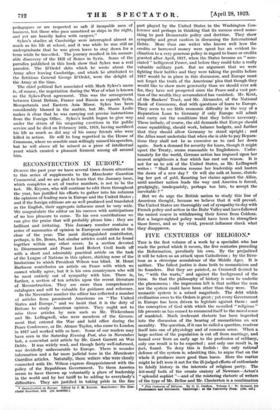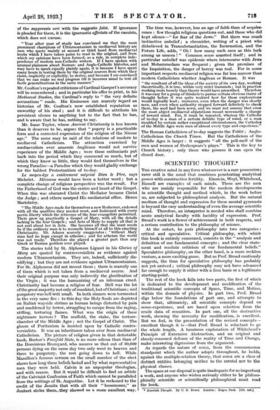FIVE CENTURIES OF RELIGION.*
Tars is the first volume of a work by a specialifit who has made the period which it covers, the five centuries preceding the Reformation, peculiarly his own. By the prejudiced it will be taken as an attack upon Catholicism ; by the frivo- lous as a chronique scandaleuse of the Middle Ages. It is neither. The fullest justice is done both to monasticism and its founders. But they are painted, as Cromwell desired to be, " with the warts," and against the background of the time. So that the philosophy of history is seen to underlie the phenomena : the impression left is that neither the men nor the system could have been other than they were. The monastic system is a mixed magnitude. The debt which civilization owes to the Orders is great ; yet every Government in Europe has been driven to legislate against them : and the conception of God with which the so-called " religious " life presents us has ceased to commend itself to the moral sense of mankind. Much irrelevant rhetoric has been imported into the discussion of the bearing of monasticism on sex morality. The question, if it can be called a question, resolves itself into one of physiology and of common sense. When a large section of the population is cut off from marriage, and bound over from an early age to the profession of celibacy, only one result is to be expected ; and only one result is, in fact, found. To deny this is foolish : the only rational defence of the system is, admitting this, to argue that on the whole it produces more good than harm. Here the matter might be left were it not for the ill-judged efforts of enthusiasts to falsify history in the interests of religious party. The leit-motif both of the ornate oratory of Newman—Acton's " splendid sophist "—and of the roistering rhetoric of writers of the type of Mr. Belloc and Mr. Chesterton is a combination • Five Centuries of Religion. By G. G. Coulton. Volume I.: St. Bernard. Ms Predecessors and Successors. Cambridge: at the University Press. 130s. net.]
of the suppressio veri with the suggestio falsi. If ignorance Is pleaded for them, it is the ignorantia affectata of the casuists, which does not excuse.
" Year after year of study has convinced me that the most prominent champions of Ultramontanism in mediaeval history are men who quote mainly at second or third hand from mediaeval books which I have taken pains to read in the original, and from which my opinions have been formed; as a rule, in complete inde- pendence of modern non-Catholic writers. If I have spoken with unusual plainness about Roman- and Anglo-Catholic histories, and may have to speak equally plainly again, it is because I have spent many hours in testing them by the original sources from which they claim, implicitly or explicitly, to derive, and because I am convinced that we can make no real progress till it becomes usual to test all facile generalizations in the same manner."
Mr. Coulton's repeated criticisms of Cardinal Gasquet's accuracy will be remembered ; and in particular his offer to print, in his Mediaeval Studies, the Cardinal's reply to " the very definite accusations " made. His Eminence can scarcely regard an historian of Mr. Coulton's now established reputation as unworthy of his steel ; and it is difficult to attribute his persistent silence to anything but to the fact that he has, and is aware that he has, nothing to say.
Mr. Isaac Taylor, whose Ancient Christianity is less known than it deserves to be, argues that " popery is a practicable form and a corrected expression of the religion of the Nicene age." The same may be said of the relations of modern to mediaeval Catholicism. The attraction exercised by mediaevalism over anaemic Anglicans would not survive experience of the Middle Ages ; were these enthusiasts put back into the period which they commend so much, but of which they know so little, they would find themselves in the wrong Paradise—a Paradise which they would gladly exchange for the baldest Protestantism of to-day.
Le moyen-dge a entiarement meprise Dieu le Pare, says Michelet. Meconnu would have been a better word ; but a complete change of religious perspective was the result. For the Fatherhood of God was the centre and heart of the Gospel.
When this was obscured Christ the Mediator became Christ the Judge ; and others usurped His mediatorial office. Hence Mariolatry.
" The Middle Ages made for themselves a new Redeemer, endowed with all the qualities they needed most, and fashioned with every poetic liberty which the reticence of the four evangelists permitted. There grew up practically a Gospel of Mary, with all the details lacking in the four Gospels ; and Acts of Mary to supply all that is not said about her in Acts. She becomes all that she must needs be if the ordinary man is to reconcile himself at all to this exacting Christianity. Mr. Mains scarcely exaggerates : ' without Mary man had no hope except in atheism ; and for atheism the world was not ready. Therefore she played a greater part than any Greek or Roman goddess ever played.
The stories told by St. Alphonsus Liguori in his Glories of Mary are quoted by controversialists as evidence against modern Ultramontanism. They are, indeed, sufficiently dis- edifying ; but they are not evidence against Ultramontanism.
For St. Alphonsus did not invent them ; there is scarcely one of them which is not taken from a mediaeval source. And their original purpose was only indirectly the glorification of the Virgin ; it was the humanizing of an inhuman creed. Christianity had become a religion of fear. Hell was the lot of the great majority not only of mankind, but of Christians ; and purgatory was hell writ small. In both sinners were tormented in the very same fire : to this day the Holy Souls are depicted on Italian wayside shrines as human beings distorted by pain and maddened by terror, struggling to escape from the raging, stifling, torturing flames. What was the origin of these nightmare horrors ? The scaffold, the stake, the torture- chamber of the Middle Ages ; not the Gospel of Christ. The gloom of Puritanism is insisted upon by Catholic contro- versialists. It was an inheritance taken over from mediaeval Catholicism. The picture of religion given in that detestable book, Boston's Fourfold State, is no more odious than than of the Dominican Bromyard, who assures us that out of 80,000 persons dying on the same day two only went to heaven and three to purgatory, the rest going down to hell. While Massillon's famous sermon on the small number of the elect
shows how long these beliefs lasted and by what representative men they were held. Calvin is an unpopular theologian, and with reason. But it would be difficult to find an article of the Calvinist Confession of Faith which cannot be paralleled from the writings of St. Augustine. Let it be reckoned to the credit of the Jesuits that with all their " loosenesses," as Joubert styles them..they showed ua a more excellent way.
The time was, however, less an age of faith than of acquies.
cence : few thought religious questions out, and those who did kept silence—" for fear of the Jews." But there was much instinctive unbelief ; a chronicler, writing of a priest who disbelieved in Transubstantiation, the Incarnation, and the Future Life, adds, " Oh ! how many such men as this lurk among us unseen ! " Common sense asserted Itself ; and in particular unbelief was epidemic where intercourse with Jews and Mohammedans was frequent ; given the premises of the Inquisition, the danger of heresy was real. For in some important respects mediaeval religion was far less narrow than modern Catholicism whether Anglican or Roman. It was " the resultant of all the ideas of the society of its own day, working theoretically, it is true, within very strict trammels ; but in practice working more loosely than theory would have prescribed. Therefore it was easy for a group of thinkers to pursue certain obvious trains of thought before it was quite realized how far these explorations would logically lead ; moreover, even when the danger was clearly seen, and even when authority stepped forward definitely to check them, the seed had been sown, and we must not assume that even the most abject mediaeval abjurations meant necessarily a change of inward mind. For, it must be repeated, whereas the Catholic of to-day is a man of a certain definite type of mind, or a man moulded by certain rather exceptional circumstances, the Catholics of the Middle Ages were men of almost every type and experience."
The Roman Catholicism of to-day suggests the Tablet ; Anglo- Catholicism the Church Times. But the Catholicism of the Middle Ages is larger : it suggests " all the pell-mell of the men and women of Shakespeare's plays." This is the key to Church history ; only those who possess it can open the closed door.



















































 Previous page
Previous page